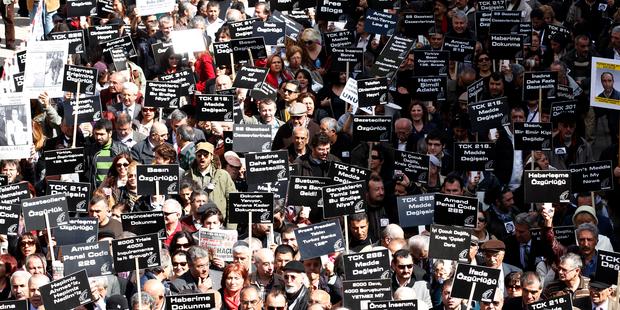A package of reforms before Turkey's Parliament risks being a missed opportunity to bring the country's laws in line with international human rights standards and leaves people vulnerable to a range of abuses including jail just for expressing an opinion, Amnesty International said in a new report out today.
"The right to freedom of expression is under attack in Turkey. Hundreds of abusive prosecutions are brought against activists, journalists, writers and lawyers. It is one of Turkey's most entrenched human rights problems," said John Dalhuisen, Amnesty International's Director for Europe and Central Asia.
Amnesty International's report, Decriminalize dissent: Time to deliver on the right to freedom of expression, analyses the current law and practice related to the ten most problematic articles threatening freedom of expression under the Turkish legal system.
The reforms – called the "Fourth Judicial Package" – fail to make the necessary legislative amendments to bring national law in line with international human rights standards.
"The criminalization and incarceration of individuals simply for expressing their opinions must not continue. Now is the time for the government to show their commitment to freedom of expression" said Dalhuisen.
"Successive rounds of reform failed to address the core of the problem – Turkey must now overhaul the definition of offences within its Penal Code and Anti-Terrorism Law."
"Most abusive prosecutions target either individuals' criticism of public officials or their expression of legitimate views on sensitive political issues. The Turkish authorities must accept criticism – and respect the right to freedom of expression" said Andrew Gardner, Amnesty International's expert on Turkey.
The notorious Article 301 of the Penal Code "Denigration of the Turkish Nation", used to prosecute and convict murdered journalist and human rights defender Hrant Dink, remains in force. So does Article 318, "Alienating the public from military service", used to prosecute support for the right to conscientious objection. Both must be abolished.
Recent years have seen increasingly arbitrary use of anti-terrorism laws to prosecute legitimate activities including political speeches, critical writing, attendance of demonstrations and association with recognised political groups and organizations – in violation of the rights to freedom of expression, association and assembly.
"Amending Turkey's overly broad and vague definition of terrorism is a must, only this can end the abuses in prosecutions for "membership of a terrorist organization" and other such offences," said Gardner.
Peaceful discussion of Kurdish rights and politics are prosecuted under provisions criminalizing terrorist propaganda. Analysis of the issue and slogans shouted at pro-Kurdish demonstrations are frequently prosecuted as "terrorist propaganda."
"A society where people can freely express their opinions, where they can debate the most pertinent issues of the day without the threat of prosecution is a healthy society, and the kind Turkey needs to become" said Dalhuisen.
"A fundamental legal reform removing the shackles on freedom of expression, association and assembly will clear the air in Turkey, it's an essential step for a peaceful and democratic Turkey," said Gardner.
Cases
Temel Demirer was prosecuted for saying that Hrant Dink had been killed because he was Armenian and making allegations about the state's role in his killing, Temel Demirer talked about the massacres of Armenians in Turkey after 1915.
Conscientious objector Halil Savda has been convicted on multiple occasions for supporting publicly the right to conscientious objection. He has been accused of "alienating the public from military service".
Lawyer Selçuk Kozağaçlı was prosecuted in February 2010 for calling for justice for the deaths of prisoners in a 2000 prison operation when the military invaded twenty prisons across the country to end a prolonged hunger strike. In January 2013 in a separate indictment, Selçuk Kozağaçlı was charged with membership of the banned leftist group, the Revolutionary Peoples' Liberation Party-Front (DHKP-C). As of February 2013 he remained in pre-trial detention.
In April 2012 Fazıl Say, a pianist of international renown, was prosecuted for tweets he made mocking religious individuals and Islamic conceptions of heaven. As of February 2013, there had been two court hearings; a third is scheduled for 15 April.
Investigative journalists Ahmet Şık and Nedim Şener, are currently being prosecuted on charges of supporting the activities of Ergenekon, an alleged criminal network engaged in a plot to violently overthrow the government for "knowingly and willingly supporting a terrorist organization". The evidence against Ahmet Şık is based largely on his book "The imam's army", which alleges the existence of a network within state institutions and civil society made up of followers of the Turkish Islamic scholar in exile, Fetullah Gülen, a supporter of the Justice and Development party (AKP) government. The evidence against Nedim Şener consists of no more than written works and tapped telephone conversations with defendants in the Ergenekon case about matters not related to any crimes.
In January 2009 Vedat Kurşun, editor and owner of Azadiya Welat, Turkey's only Kurdish language newspaper was convicted on multiple counts for "committing a crime in the name of a terrorist organization" and for "Making propaganda for a terrorist organization" to a total of 166 years and six months. Following appeal he was acquitted of the first offence and sentenced to 10 years and 6 months imprisonment for "Making propaganda for a terrorist organization."
62 year-old Sultani Acıbuca, member of a group of mothers who have lost or had sons imprisoned as part of the conflict between the Turkish army and the PKK, was convicted of being a member of a terrorist organization for calling for peace and an end to the conflict.

